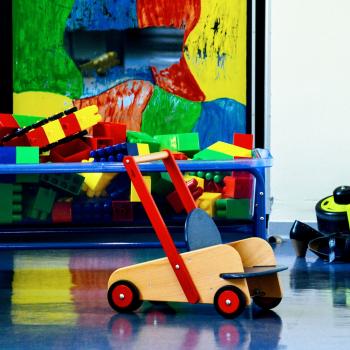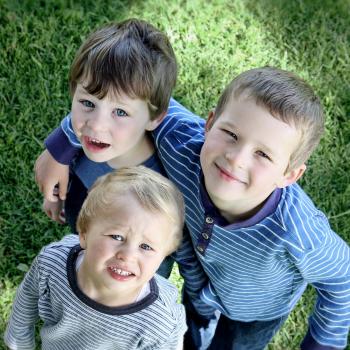Reader Chrissy, who grew up in a large Quiverfull family, recently sent me an email with a question. I’m reprinting it here before adding my thoughts and opening the floor for input and discussion.
I have a question for you, Libby, about something I have been pondering recently. It would seem that I am not a very helpful person. I rarely lend a hand unless there is something “in it for me”. I am over-the-top helpful at my job, because I am invested in my paycheck and want to keep it coming. I am helpful to my husband by making his lunch every day—but I know that it saves money we can then spend on fun things. But, when I’m at my parents’ house surrounded by my younger siblings, I don’t want to DO anything. I don’t want to set the table, help with meals, straighten up the living room, or even intervene in my siblings’ fights or rowdy play. I don’t give money to charity, I don’t volunteer at soup kitchens, I don’t take my old clothes to Goodwill, I don’t make meals for sick people, or do any of the other things I was raised to believe that “good people” do. I care about people, but apparently not enough to do anything. Why?
I’m the second oldest of 12 children, homeschooled, fundamentalist, evangelical, authoritarian, the works. My question is, how much of my current “selfishness” can be chalked up to personality (hey, maybe I’m just a selfish person!) and how much of it is because of my upbringing? I was raised to say “how high!” the second an adult said “jump”. I spent over half of my highschool years as the sole chef for my family of 14, cooking three meals a day, 7 days a week. I changed diapers, gave baths, washed & folded laundry, cleaned, vacuumed, babysat, made snacks, oversaw homework, tutored piano and art, and basically spent 18 years being “on call” every second of the day. I was expected to do these things cheerfully, immediately, and without complaint. Is it possible that my “helpful spirit” has disappeared because I’m clinging to my new-found autonomy? Quite frankly, the thought of having & caring for kids of my own makes me want to cry. I can finally do anything I want and am a little disturbed by how self-centered I’ve become.
Am I a terrible person?
Chrissy
Okay, now my thoughts.
First, I’ve often heard people say that after growing up in fundamentalist churches, even if they still believe in God and Jesus, etc., they find that they need a period away from organized religion and formal church services to “detox.” I have to wonder if something similar is going on here. After being required to help with cooking and cleaning and childcare for so many years, likely as a sort of junior mother, Chrissy explains that now that she has a choice she now wants anything but. And that’s not surprising! In fact, it sounds pretty natural!
Second, this really puts a lie to the idea that if you force your kids to be helpful now, they’ll automatically be helpful when they grow up. Sure, they might. Or, when they grow up and find that no one is forcing them to be helpful they might just stop doing so altogether. The same goes for a myriad of other things as well. For example, forcing children to do homework doesn’t teach them how to force themselves to do homework. This is something I’m trying to be aware of as I raise my own children.
Third, self-care is important. Oftentimes those who spend their lives helping others because they believe that is what is required of them neglect or push aside care of self. Think of the Duggars’ JOY formula—Jesus first, Others second, Yourself last. But you know how in the airplane they tell parents to put their own air masks on first and then put on their children’s air masks? The same thing goes when it comes to helping others—if you don’t make sure to take care of yourself, you will become burnt out and unable to effectively care for others. The unfortunate thing is that those from a Quiverfull background often grow up believing that any form of self care—anything that focuses on self rather than on others—is selfish and therefore wrong. This is simply not true, and getting out of that mindset can be challenging.
Fourth, I think that we as people are generally more selfish than we like to let on. For instance, I volunteer as an escort at Planned Parenthood, but as hard as it can be I honestly get a lot of satisfaction out of it, because it finally allows me to feel as though I’m actually doing something. I think the idea that there are these ideal selfless people out there whose pure goodness overflows into flowery service to others is severely overblown. I point this out simply because Chrissy seems to be looking at her own “selfishness” in contrast to the “selflessness” of others, and it’s just not that simple.
That all said, what advice would I give Chrissy? First, no, Chrissy, I don’t think you’re a terrible person. Second, I would suggest that you see the time spent on yourself as self care, as a time of learning who you are and becoming healthy and happy as an individual. But third, it seems like your “selfishness” is bothering you. I think you it might help to realize that just because you don’t have a desire to be helpful to others in one arena—you mention helping out with cooking and cleaning and childcare while visiting your parents’ home—doesn’t necessarily mean that you will have no desire to be helpful to others in any arena. Let your interests guide you. Do you like art, or animals, or yard work? Rather than trying to force yourself to help others in ways that you find unpleasant, or shove yourself into a box, simply keep your eyes open for things that line up with what you already enjoy, what interests you, and what you are passionate about.
And now I want to open the floor to everyone else. What advice or thoughts do you have for Chrissy?














